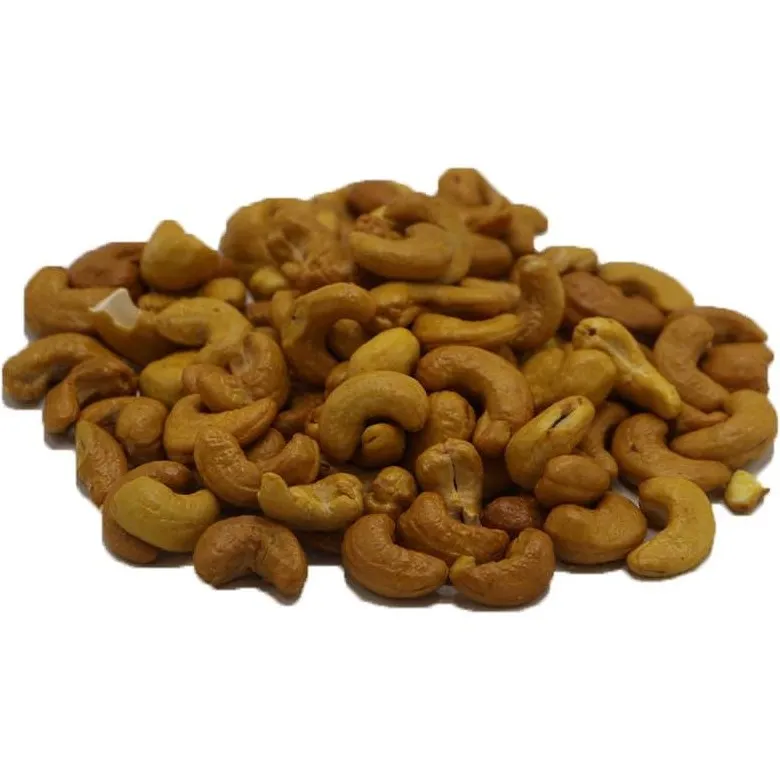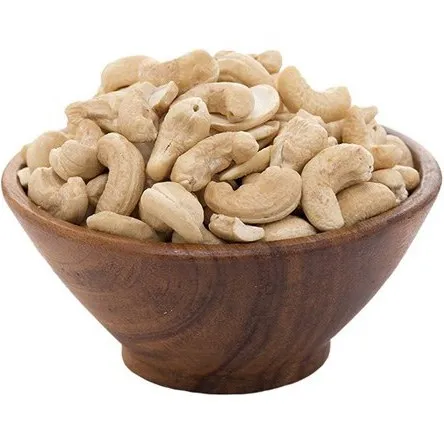Roasted cashew nuts are a popular and irresistible snack enjoyed by millions worldwide. With their rich, buttery flavor, satisfying crunch, and remarkable nutritional profile, it’s no wonder that these small, crescent-shaped delights have become a staple in the nut aisle. In this article, we delve into the world of roasted cashew nuts, exploring their history, cultivation process, health benefits, culinary uses, and market trends.
History and Cultivation:
Cashew nuts, scientifically known as Anacardium occidentale, are native to Brazil but are now widely cultivated in several regions globally, including India, Vietnam, Nigeria, and Cote d’Ivoire. The cashew tree is unique, as it bears both fruit and a nut. The cashew nut grows out of a pear-shaped fruit called a cashew apple, which is not typically consumed outside of certain regions due to its tart and astringent taste.
The cashew nut itself is encased in a tough shell, which must be roasted and cracked open to be enjoyed. The roasting process helps remove the toxic urushiol resin found in the shell, ensuring the safety of the cashew nut.
Health Benefits:
Roasted cashew nuts are not just a delicious snack; they also offer an array of health benefits. They are an excellent source of healthy fats, including monounsaturated and polyunsaturated fats, which are known to support heart health. These fats help lower bad cholesterol levels, reducing the risk of heart disease.
Cashews also contain essential vitamins and minerals, including vitamin E, vitamin K, magnesium, copper, and phosphorus. Vitamin E is a powerful antioxidant that protects cells from damage caused by free radicals, while vitamin K is involved in blood clotting and bone metabolism.
Furthermore, cashews are a good source of plant-based protein, making them a suitable option for vegetarians and vegans. Protein is essential for muscle growth, repair, and maintenance. Cashews also contain dietary fiber, which aids in digestion and helps maintain a healthy weight by promoting a feeling of fullness.
Culinary Uses:
In addition to their nutritional value, roasted cashew nuts are incredibly versatile in the kitchen. They add a delightful crunch and flavor to a wide range of dishes, both savory and sweet.
Roasted cashews are often used as a topping in salads, stir-fries, and rice dishes, providing a contrast in texture and enhancing the overall taste. They can be ground into a fine powder and used as a base for sauces, dressings, and nut butter. Roasted cashews are also a popular ingredient in baked goods, from cookies and cakes to energy bars and granola.
Furthermore, cashew milk, a non-dairy alternative, can be made by blending roasted cashews with water and straining the mixture. This creamy and slightly sweet milk can be enjoyed on its own or used as a substitute for cow’s milk in various recipes.
Market Trends:
The global market for roasted cashew nuts has experienced significant growth in recent years, driven by several factors. Firstly, the increasing popularity of plant-based diets has led to a surge in demand for nut-based products, including cashews. As consumers become more health-conscious and seek out nutritious alternatives, roasted cashew nuts provide a satisfying and wholesome snack option.
Additionally, the rising awareness of food allergies and intolerances has prompted individuals to seek out allergen-friendly snacks. Cashews are naturally gluten-free and are less likely to cause allergic reactions compared to other nuts, making them a preferred choice for those with dietary restrictions.

Moreover, the growing trend of mindful and conscious eating has led consumers to opt for snacks that are sustainably sourced and produced. Cashews are a crop that supports farmers in economically disadvantaged regions, and many companies emphasize fair trade and environmentally friendly practices in their sourcing and production methods.
Conclusion:
Roasted cashew nuts are not only a treat for the taste buds but also a nutritious snack that offers numerous health benefits. With their rich flavor, satisfying crunch, and versatility in the kitchen, they have become a favorite among snack enthusiasts and culinary enthusiasts alike. As the demand for healthy, plant-based snacks continues to rise, it is safe to say that roasted cashew nuts will continue to be a staple in pantries around the world, providing a guilt-free indulgence for years to come.I. Market Demand and Growth Opportunities:
The market for roasted cashew nuts has witnessed remarkable growth in recent years, driven by several factors. The increasing demand for healthy and nutritious snacks, coupled with the rise of plant-based diets, has contributed to the popularity of roasted cashew nuts. Consumers are actively seeking out food options that are both delicious and beneficial to their well-being, making roasted cashew nuts a great choice.
Furthermore, the convenience factor of roasted cashew nuts also plays a significant role in their market demand. As a portable and ready-to-eat snack, they are a convenient option for busy individuals, offering a quick source of energy in a tasty format.
II. Global Export and Import Trends:
Cashews are predominantly grown in tropical regions, with India, Vietnam, and Nigeria being the largest producers. However, the demand for roasted cashew nuts extends beyond the regions where they are cultivated. This has led to a significant global trade in cashew nuts, with countries importing and exporting them to meet the growing demand.
The United States, Europe, and Asia are major importers of roasted cashew nuts, while countries like Vietnam and India have emerged as major exporters. The export market for roasted cashew nuts is highly competitive, with various players vying for a share of the lucrative market.
III. Packaging and Presentation:
Roasted cashew nuts are typically sold in various packaging options to cater to different consumer preferences. Plastic bags, resealable pouches, and canisters are common packaging formats, ensuring the freshness and longevity of the product.
Attractive and eye-catching packaging designs are often employed to entice customers and differentiate brands in a competitive market. Accurate labeling of nutritional information, certifications (such as organic or fair trade), and allergen warnings are also important considerations in packaging roasted cashew nuts.
IV. The Competitive Landscape:
The market for roasted cashew nuts is home to numerous brands, ranging from large-scale manufacturers to small artisanal businesses. Each brand offers its unique take on the roasting process, flavor combinations, and packaging. This diversity provides consumers with a wide selection to choose from, creating a competitive landscape.
Brands aim to differentiate themselves based on factors such as quality, taste, sustainability, and ethical sourcing. Unique flavor profiles, including options like honey-roasted, chili-spiced, or salted caramel, have become popular choices for consumers looking for exciting variations.
V. Health and Wellness Trends:
Health and wellness trends influence consumer choices, and roasted cashew nuts align perfectly with these preferences. Cashews contain heart-healthy fats, essential vitamins, minerals, and dietary fiber, making them an ideal choice for individuals seeking nutritious snacks.

Moreover, factors such as the increasing incidence of chronic diseases, growing awareness of the importance of a balanced diet, and the pursuit of weight management have fueled the demand for healthier snack options like roasted cashew nuts.
VI. Ethical Sourcing and Sustainability:
Sustainability and ethical sourcing have become key considerations for consumers when purchasing food products. Roasted cashew nuts provide an excellent opportunity for brands to showcase their commitment to responsible sourcing practices.
Many companies promote fair trade partnerships with farmers in cashew-producing regions, ensuring a fair price for their produce and supporting local communities. Additionally, some brands prioritize organic cultivation methods, which eliminate the use of harmful chemicals, benefiting both the environment and consumers.
VII. Marketing Strategies:
To capture the attention of consumers and drive sales, marketing strategies play a crucial role. Digital marketing platforms, social media, and influencer collaborations are commonly employed by brands to create brand awareness and engage with their target audience.
Product promotions, discounts, and tastings in supermarkets or specialty stores are also effective ways to showcase the deliciousness and quality of roasted cashew nuts. Additionally, partnering with health and fitness influencers or including recipes in marketing campaigns can further emphasize the versatility and culinary potential of roasted cashew nuts.
VIII. Challenges in the Industry:
Despite the immense popularity of roasted cashew nuts, the industry does face certain challenges. Fluctuating cashew prices due to factors like weather conditions, market demand, and geopolitical factors can directly impact production costs and profit margins for farmers and manufacturers.
Moreover, ensuring consistent quality and taste can be a challenge, as the roasting process requires precision and expertise. Brands must invest in state-of-the-art equipment and hire skilled technicians to maintain excellent quality standards.
IX. Innovation and New Product Development:
To stay competitive in the market, brands are consistently innovating and expanding their product offerings. This includes developing new flavor profiles, introducing unique packaging formats, and exploring product extensions.
For example, the introduction of roasted cashew nut butter, chocolate-coated cashews, or cashew-based energy bars showcases the versatility and creativity of the industry. Such innovations appeal to diverse consumer preferences and expand the market reach of roasted cashew nuts.
X. Consumer Trends and Future Outlook:
As consumers continue to prioritize health and wellness, the demand for roasted cashew nuts is expected to grow steadily in the coming years. The nut’s rich nutritional profile, convenience, and delicious taste make it an appealing choice for health-conscious consumers.
Additionally, as sustainability and ethical considerations gain prominence in purchasing decisions, certified and responsibly sourced roasted cashew nuts will likely attract a larger consumer base. The ongoing focus on innovation and product development will further drive market growth, offering consumers exciting new choices in the world of roasted cashew nuts.

Conclusion:
Roasted cashew nuts have achieved iconic status as a popular and irresistible snack loved by consumers globally. Their historical significance, cultivation process, health benefits, culinary versatility, and market trends all contribute to the enduring appeal of roasted cashew nuts. With the industry embracing sustainability, ethical sourcing, and continuous innovation, it is clear that the future of roasted cashew nuts is set to be even more exciting and promising.










